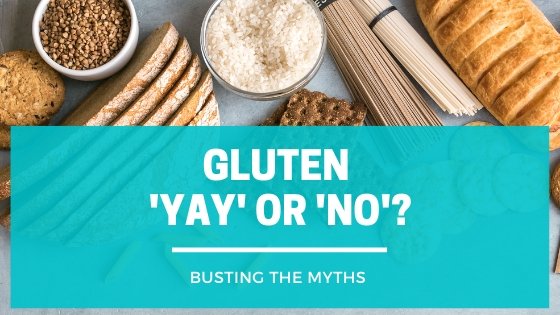
Gluten- yay or no?
Table Of Content
Let's see what science says.
Why is everyone climbing the gluten-free train lately? And more importantly, what does science say?
A huge body of research point's to the fact that gluten is extremely important to our diet as it REDUCES inflammation and prevents us from an array of diseases. We will explore this further in this article.

Gluten and Health:
"Whole grains provide us with dietary fibre (also known as “roughage”), which is essential to maintaining healthy digestion. Chose whole grain breads, wholewheat pasta and brown rice. These foods are rich in whole grains and should make up one third of the food we eat.
Eating plenty of dietary fibre keeps our digestive processes ticking over and promotes the growth of beneficial bacteria in our bowels. However the benefits extend much further than this, by increasing our intake of dietary fibre we also reduce our risk of developing serious diseases including stomach cancer, colorectal cancer, type 2 diabetes, heart attack, angina and stroke."- Dr Alan Desmond. MB, BCH, BAO, BMEDSC, MRCPI, FRCP
Ask yourself, if not grains then what? If you eliminate grains from your diet, you are likely to fill up your plate with meat, dairy, and processed grain-free snacks. These are not only worse for your system, but also fail to offer some of the benefits that grains do.
Whole grains like gluten contain fiber and nutrients including B vitamins, magnesium, and iron, which is why it is important not to avoid them. There are even proven health benefits of eating gluten for the prevention of diseases. Let's look at some key research:
-
Lowered risk of heart disease – a Harvard School of Public Health study over 100,000 subjects for 25 years found a significantly lower rate of heart disease among participants with the highest intake of gluten. Gluten consumption is also linked to a 15 percent lower risk of getting coronary heart disease. Therefore, it concluded that a gluten-free diet should not be promoted or recommended to people without gluten allergies.
-
Lower calorie intake – a study in Europe was conducted to analyze the nutritional composition of foods that are gluten-free against the ones which are not. The results were astonishing as they found that the gluten-free food products had a significantly higher amount of calories, saturated fatty acids, protein, and even sugar.
-
Reduced risk of Type 2 Diabetes – data presented at the American Heart Association reported that the subjects with a gluten-inclusive diet had the lowest risk of type 2 diabetes upon follow-up for over 30 years. The difference noticed was a 13 percent lowered risk of diabetes.
Sure, stay away from maida and processed pastries, but don’t unnecessarily cut out roti’s and pasta from your diet.
Hope this helps!
Roshni Sanghvi.
Want Some Motivation? Listen To Our Client's Diabetes Reversal Story.
Let's Just Talk. No Obligations.
I do free consultations every Tuesday's and Thursday's. Either way you will get some actionable tips to reach your fitness goals faster.


Comments
Leave a comment